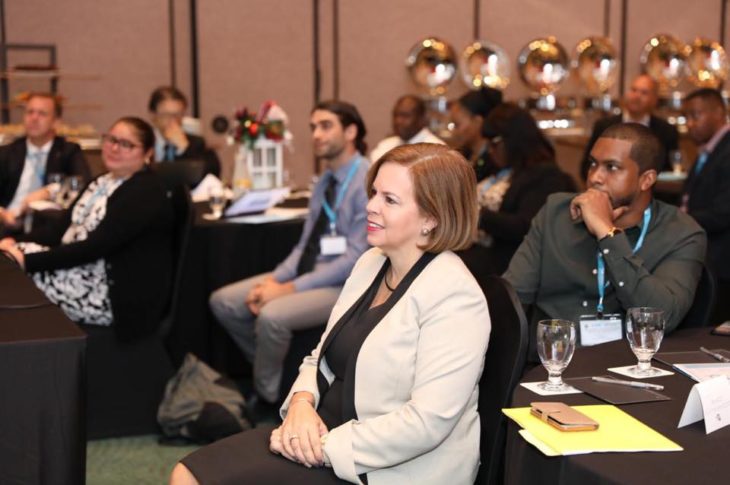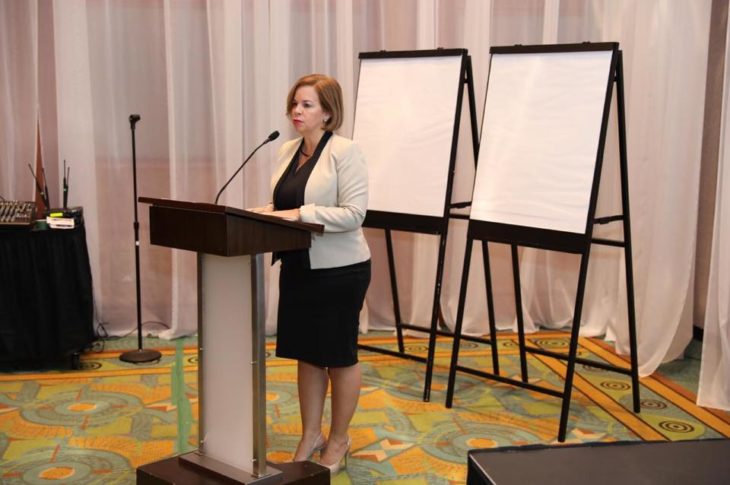Prime Minister's Speech on Climate Resilience

“First of all, on behalf of the Government of Aruba, I would like to extend a most warm welcome today to the visitors from abroad, including the representatives of IRENA as well the representatives of other islands in the Caribbean region. Welcome to Aruba. We thank IRENA for selecting Aruba as a location for this event. We are most honored to host you and we wish you a productive conference in Aruba.
Over the next few days you will be discussing energy issues for small islands development states and specifically addressing the central question of this conference, being: “how to strengthen resilience and accelerate renewable energy deployment.”
Now this question, the question that is central to this conference, is a very relevant one for all Caribbean islands. In a few moments I will share with you how we are dealing with this in Aruba. But first I would like to point out that energy is of vital importance to our economies because it is present in so many facets of the economy. Energy has a lot of shapes. It is mostly known as electricity. But it also takes a lot of energy to produce water in islands. We need energy for transportation and cooking. And we need energy for cooling in the build environment. The cost-price of energy is therefore a strong determinant for our macro-economic and socio-economic development. And as you now, in islands this cost-price is in general significantly higher than in mainland economies due to our small scale. The dependency on fossil fuels and its historically volatile price fluctuations therefore creates uncertainty for cost of living, and for economic growth, and it has long been argued that sustainable energy will be the grand solution to this dilemma.
However, in our experience renewable energy needs to be dealt with very carefully. Aruba is no exception when it comes to the availability of renewable energy resources. We have over 5000 wind hours and over 2000 solar hours per year. In 2009 we commissioned a wind farm which has been operating very successfully. We also installed solar farms and we allow Distributed Generation. Together these resources are on track to account for approximately 20% of our annual domestic energy consumption.
In 2012, Aruba presented a 100% sustainable energy target for 2020 at the Rio+20 conference. This strategy prioritized the inevitable environmental concerns of our small island and also moving away from reliance on the fluctuations of the oil market.
Today, leading up to a decade after the introduction of the 2020 target and an evaluation of the energy transition plans, stakeholders urged the Government to revisit the vision and together establish a more realistic goal. With the recent change in political mandate, the new Government of Aruba led by me as the Prime Minister and Minister of Energy, set as one of our first agenda points to re-asses the investments made to date and reform Aruba’s energy vision.
The new Re-thinking Energy framework for Aruba is therefore the organic result of reflection on lessons learned from the 2020 vision setback. Known for our spirit of resilience and re-invention, a humbled and stronger than ever Aruba, we have set to once again lead the region into adopting a sensible and human-centered approach to renewable energy transition. Moreover, the Energy Transition cannot be considered in isolation, as it is inherently linked to the needs of the society it serves. By introducing this new sensible approach to energy, our new target will not be measured in percentages, but in impact!
As a pillar of the Re-thinking Energy framework we will be carefully revisiting Renewable Energy. The drive for Renewable Energy comes to a large extent from the global agenda to further reduce our dependency on fossil fuels, mitigate climate change and move to a cleaner environment.
But there are more reasons to use renewable energy: Renewable energy will also reduce imports, keep energy production in the internal economy and therefore strengthen the balance-of-payments. This is beneficial for stability of our currency and of interest to our Central Bank and international monetary institutions.
So whereas we believe in the benefits of Renewable Energy we need to be realistic. The integration and incorporation of more Renewable Energy introduces more dynamics into our energy system and this should not jeopardize the Reliability of our energy system! Simply stated: we do not want black-outs on our island. Moreover, it has financial implications. The art is to seek a balance and to ensure that the so-called ‘Levelized Cost of Energy”, remains stable or is lowered. If not done well, the opposite can also occur and that is that energy will become more expensive due to renewable energy investment. As you will understand, the bottom line about Renewable Energy Integration is that the energy system needs to become Sustainable, but it has to remain Reliable, and most of all it needs to be kept Affordable. Yet, the best thing is if renewable energy can help to achieve that affordability by reducing the risk of expensive oil imports at times of shocks in the global oil market and stabilizing the energy price. I wish you productive discussions on this topic in coming days.
The balance between Sustainable, Reliable and Affordable therefore has to be engineered very carefully and this is where Government direction is important. Within the Re-thinking Energy framework the new approach is therefore to put affordability and price stability central and then to see how increased Renewable Energy can contribute to this goal. This is a fundamental new way of thinking compared to recent years although it is the same philosophy as applied for the establishment of Aruba’s first wind park.
Another key pillar of the Re-thinking Energy framework is going back to Energy Efficiency. Ladies and Gentlemen, I will be very honest with you in saying that for our island, Aruba, the truth is that the greatest advances in the energy system have been achieved so far through Energy Efficiency more even than through Renewable Energy. Back in 2006-2007 we embarked on a strategic initiative spanning more than 10 years with the objective to increase the operating efficiency of our local utilities. By replacing energy and water production assets with more efficient equipment we managed to substantially reduce the consumption of heavy Fuel Oil (“HFO”) required for domestic energy production.
Energy Efficiency is also very much about the demand side of the energy system. By using energy in a more conscious manner, by being more energy efficient, we create a direct contribution to reduction of our carbon footprint. The fact is that a large portion of energy in our island is consumed in buildings. The application of insulation materials in the built environment, to keep cooling inside buildings, to prevent buildings from warming up can drastically reduce cooling consumption. We have seen that savings in energy can be up to 30% by retrofitting existing building. Just imagine if all existing buildings would be retrofitted or if all new buildings would be built in this manner. As part of the Re-thinking Energy framework we are going to look further into this and how we can foster the adoption of these practices. Actually, due to its importance I would like to encourage you also to discuss Energy Efficiency at this event or at follow-up meetings.
Ladies and Gentlemen…, I am now almost at the end of this address and there are some final thoughts I would like to convey to you. One of them is the importance of stakeholder alignment with regard to the energy system; and the roles that the various stakeholders involved need to play.
In Small Island Development States the energy system is mostly characterized by a closed structure. In this structure a state-owned utility company is playing a central role. It is important to note that energy is a long-term game. Investments in assets are recovered in typically 20 or 30 years. Governments on the other hand may change more frequently. This difference in time alone causes different dynamics for the Government and utility company. So there needs to be some common ground on the long-term direction of the energy system. A good step is development of a national energy policy. This would need to capture some long-term goals and these goals will give direction to the utility company. To manage this policy it is best to establish a Regulator; for example an Energy Directorate. As for ourselves, as part of the Re-Thinking Energy Framework, Aruba intends to better institutionalize its climate policy by initiatives such as formalizing its energy polices, enhancing associated legislation as well as exploring the establishment of an Energy Directorate.
Also, it would look at the wider national vision – for how many people are we planning the energy system and what level of macro-economic development? What is our national growth strategy? And as I mentioned in the beginning: What will we do with fuels for transport and cooking? How about water production? Do we expect any energy from waste? All of these are important factors to consider in a national energy discussion.
Another final thought is on how this is all links to climate resilience in the power sector; this is also a central topic at this conference. The power system is a critical infrastructure and of vital importance to our economy. If it is disrupted for long periods, this has huge consequences for the country. A very important resilience aspect is therefore the ability of the energy system to bounce back following extreme weather events. I will leave it to the engineers to discuss this at this conference. But there are more aspects – if buildings are destroyed then energy demand will drop for significant periods of time. And this will impact the utility company. The built environment is therefore not only important for achieving energy efficiency, but also, in a far more fundamental sense, in ensuring structural reliability which is needed to maintain a financially healthy utility for the whole country.
Discussing these questions at a national strategic level also involves stakeholders outside the utility sector, such as fuel suppliers and large consumers such as hotels. This brings more stakeholders to the table. Stakeholder alignment, ..working with stakeholders.., I can assure you, requires a great deal of listening and willingness to pursue a greater goal for the common good. In our experience, this willingness only comes about through creating mutual understanding from all parties.
Ladies and Gentlemen…, summarizing; Renewable Energy holds great value for the future of island nations. The benefits are really that it can help to reduce your dependency on fossil fuels and reduce carbon emission, help to stabilize your cost of energy and help to strengthen your balance of payments. But to reap these benefits you need to carefully organize the energy system by engaging the relevant stakeholders and ensuring the desired alignment.
Ladies and Gentlemen, it was a true pleasure speaking to you on these very relevant topics. Once more, I would like to welcome you to Aruba; and I would like to wish you a productive conference. Thank you.“
